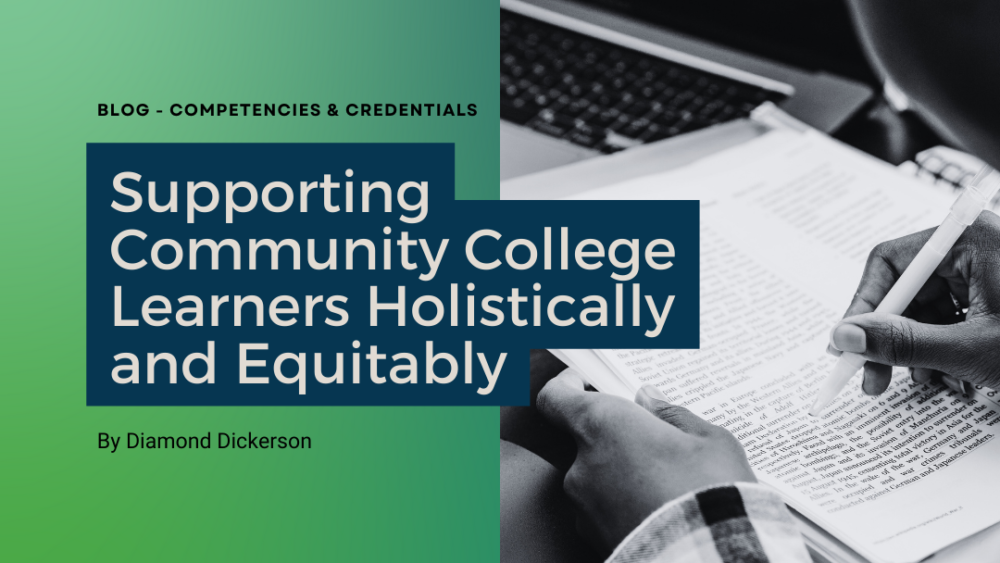The Advancing Community Equity and Upward Mobility (ACE-UP) Community of Practice convenes fifteen community colleges and their industry partners to enable peer sharing around common goals and challenges. The members represent diverse institutions but share a commitment to advancing equity and upward mobility for their learners. Recently, our small group discussion—designed to provide space for informal peer sharing around common goals and challenges—explored reimagining learner support priorities and the related challenges to advancing equity.
Providing Comprehensive Advising
One crucial point that emerged was the need to shift the traditional emphasis on academic advising towards a more comprehensive approach that encompasses the concepts of belonging, the emotional and interpersonal dimensions of the learner’s educational and career experiences, and career pathways. This suggests a shift in priorities within the education system, emphasizing not just academic guidance but also creating an atmosphere that encourages personal growth, a feeling of community, and a clear path toward future careers.
While academic advisors are essential pillars of support, they cannot serve as learners’ sole support system. Rather, a holistic support structure requires involvement from various campus units and community partners including financial aid offices, counseling services, academic departments and more. Providing support from multiple directions helps to address the multifaceted academic, emotional, career, and other needs learners face. This emphasis on cross-collaboration signifies a shift towards more personalized and adaptive guidance frameworks that combine advising and coaching methodologies based on individual learner requirements.
However, the success of such an integrated approach depends significantly on how support staff across units are trained and equipped to employ such frameworks effectively. There are salient questions around optimal advisor-learner ratios and their implications on quality of services provided. Moreover, strategic academic scheduling is vital for empowering learners to maximize their educational paths, as purposeful course planning provides students the flexibility to balance academic goals with personal responsibilities. Overall, there is a need to consider practical implementation concerns like course offerings, staff workloads, training procedures, and resource allocation when working to build robust, collaborative support systems focused on individual learner growth.
Empowering Students & Staff
Our discussion also illuminated the benefits of advising practices that empower students, contributing to their personal growth and development, such as transformational advising. a student-centered approach focused on inspiring personal growth, where advisors form trusted partnerships with learners to explore purpose and meaning, challenging students with reflective questions that catalyze self-discovery of their passions and potential. Grounding conversations in care, trust, and commitment to student-driven development, advisors motivate and empower students to creatively shape their own educational journeys. This touches upon the idea that advising should go beyond mere administrative tasks and aims to inspire personal growth and development in learners.
Another approach, Appreciative advising, shares some similarities with transformational advising. Both approaches are learner-centric, focusing on developing strong relationships between advisors and students. However, appreciative advising has a distinct emphasis on identifying and positively reinforcing students’ strengths and achievements. Advisors affirm what students are doing well rather than what they could do or become. They help students recognize and appreciate their current accomplishments and abilities. These existing attributes provide the foundation for collaborative goal setting. In contrast, transformational advising takes more of a forward-thinking perspective centered around self-discovery. The advisor supports the student in an ongoing journey of defining and pursuing goals based on who they want to become. While appreciative advising leverages present capabilities, transformational advising focuses on unrealized potential and growth. Yet both approaches value learner-centricity and advisor-student relationships to support development.
Implementing appreciative advising effectively requires substantial college investments in comprehensive advisor training programs that develop advisors’ capacities to apply this approach. When weighing such investments, institutions must holistically re-examine their broader advising model, including factors like staff capabilities, delivery methods, and technologies that can enable advisors to provide sustained, individualized support across the student journey. At its heart, appreciative advising strengthens student relationships in a way that bolsters learning, facilitates course completion, and reduces systemic barriers—expanding access to the rich academic and campus experiences community colleges offer.
Strengthening Networks of Care
As entry points for many first-generation learners, community colleges can spur profound, meaningful life changes for students through the power of education. Yet, realizing this immense potential relies on holistic learner supports spanning the entire campus ecosystem. In upcoming ACE-UP large group convenings and small group peer discussions, we seek to explore these questions:
- How do we reach and uplift learners considered non-traditional and amplify their voices?
- How are colleges funding and assessing needs around direct, non-academic supports related to basic needs, mental health, career readiness, and beyond?
Strengthening networks of care surrounding learners facilitates not just degree attainment but also preparation for career and life success. By continuing this solutions-focused dialogue on barriers facing vulnerable populations, we can actively advance equity and upward mobility for all.
Meet the Author
Diamond Dickerson
Diamond is a Senior Policy Associate with CSW’s Competencies & Credentials Team. She supports efforts to expand the use of competencies and credentials within learning and talent management systems to remove educational barriers and increase career opportunities for low-wage workers with a particular emphasis on people of color. Continue Reading >>




Comments are closed.